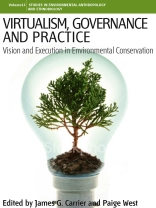Many people investigating the operation of large-scale environmentalist organizations see signs of power, knowledge and governance in their policies and projects. This collection indicates that such an analysis appears to be justified from one perspective, but not from another. The chapters in this collection show that the critics, concerned with the power of these organizations to impose their policies in different parts of the world, appear justified when we look at environmentalist visions and at organizational policies and programs. However, they are much less justified when we look at the practical operation of such organizations and their ability to generate and carry out projects intended to reshape the world.
Содержание
List of Figures, Tables and Boxes
Preface
List of Abbreviations
Introduction
James G. Carrier and Paige West
Chapter 1. Virtualism and the Logic of Environmentalism
Vassos Argyrou
Chapter 2. New Nature: On the Production of a Paradox
Maarten Onneweer
Chapter 3. A Culture of Conservation: Shaping the Human Element in National Parks
Kathy Rettie
Chapter 4. A Bridge Too Far: The Knowledge Problem in the Millennium Assessment
Colin Filer
Chapter 5. Creolising Conservation: Caribbean Responses to Global Trends in Environmental Management
Tighe Geoghegan
Chapter 6. Uncivil Society: Local Stakeholders and Environmental Protection in Jamaica
Andrew Garner
Chapter 7. ‘The Report Was Written for Money to Come’: Constructing and Reconstructing the Case for Conservation in Papua New Guinea
Flip van Helden
Conclusion: Can the World Be Micromanaged?
Josiah Mc C. Heyman
Notes on Contributors
Index
Об авторе
Paige West is Tow Associate Professor of Anthropology at Barnard College and Columbia University. She had conducted research on the linkages between environmental conservation and international development, the material and symbolic ways in which the natural world is understood and produced, and production, distribution, and consumption of various commodities. Her work is focused on Papua New Guinea.












